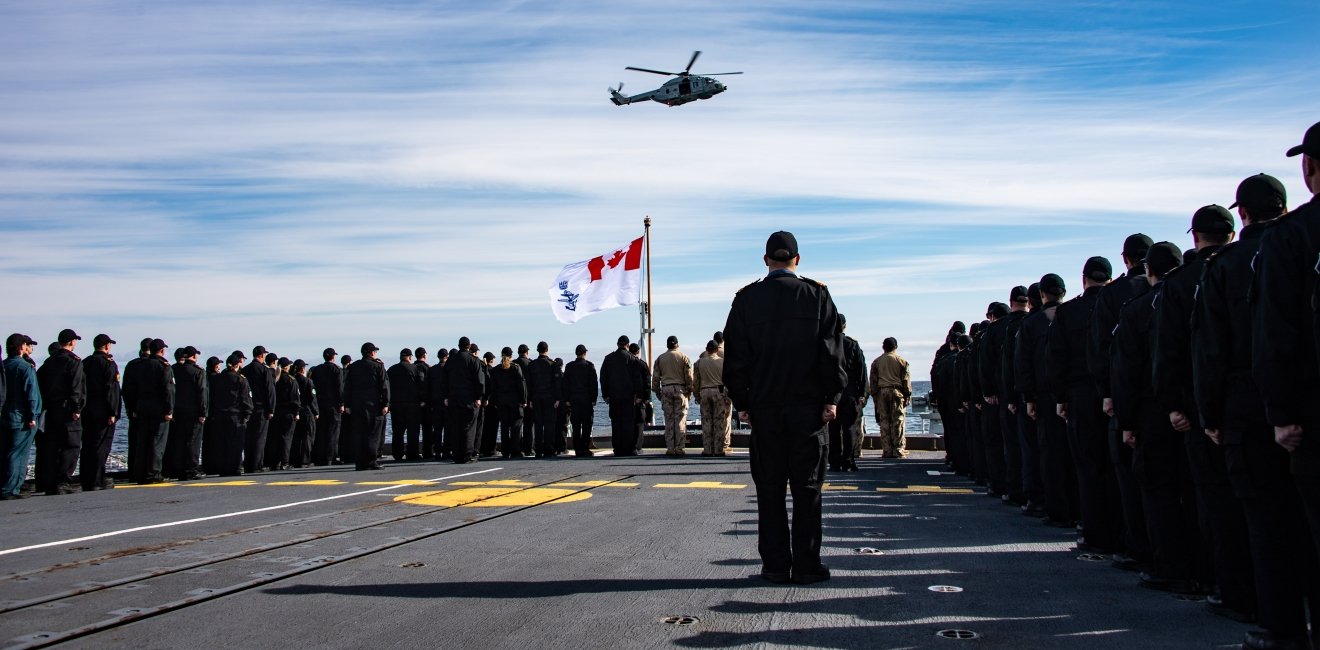Canada made waves at this year's NATO summit in Washington by pledging to spend 2% of GDP on defense by 2032, announcing $500 million in additional military assistance for Ukraine, and unveiling a new icebreaker pact with the United States and Finland.
Like the broader discourse on defense spending, initial reactions to Canada’s summit announcements have largely focused on what it will mean for the country’s standing in the world and how Canada is perceived by its allies. Proponents of raising defense spending have often (and rightly) pointed to the reputational damage that laggard spending has caused Canada in the international arena. Exclusion from AUKUS (the Australia-UK-US security pact), public comments by US congressional leaders, and negative international media are all evidence that Canada’s reputation as a security partner have been diminished in recent years.
These are good points, but by making Canadian defense solely a matter of international clout, we undersell a critical, though obvious, point: investing in a more secure, better-equipped Canada is good for Canadians.
Too often, good policy fails in this country because we focus more on how it will be perceived abroad than at home. That line of thinking holds well for an audience of globally minded elites but falls short for the majority of the population that is more concerned with putting food on their tables than how Canada is viewed in Washington or Brussels.
Take allies’ opinions out of the picture for a moment – not because they don’t matter, but because they are not the only thing that matters. How will Ottawa sell this massive increase in military expenditures to a public that already perceives government spending as being too high?
For starters, geopolitical developments have made infringements on Canadian territory more likely than at any time since the end of the Cold War. For the large share of Canadians who live below the 49th parallel (say, in Toronto, Montreal, Ottawa, and Windsor), it is easy to forget how close an increasingly belligerent Russia is to Canada’s northern territories in the Arctic Circle. Our fleet of icebreaker vessels capable of traversing Arctic waters pales in comparison to Russia’s, which boasts over 40 icebreaker ships: more than the combined fleets of the new ICE pact partners. China, claiming near-Arctic status, has also begun to invest in its own icebreakers and began construction of a third ship last year.
Territorial sovereignty in the Arctic matters to the over 200,000 Canadians who reside in our country’s northern communities and the millions of other Canadians who benefit from the region’s vast resources and increasing prominence as a channel for international maritime trade. Climate change and melting sea ice, issues in their own right, have accelerated the accessibility of shipping routes through the region. As the Arctic’s economic significance grows, so too will adversaries’ desire to control more territory.
The Arctic is also home to the North Warning System (NWS), the first line of detection for any airborne threats originating from the north. Experts and military leaders have flagged that NWS radar systems have not kept pace with the rapid evolution of weapons technologies, notably hypersonic weapons that could evade detection by virtue of their speed and maneuverability.
The 2023 downing of a Chinese spy balloon that flew over North American airspace should raise red flags about our detection capabilities. While a balloon is different from a missile, the incident is a testament to adversaries’ willingness to test our country’s radar systems and violate Canada’s air sovereignty with impunity. Ottawa has already pledged $38.6 billion to modernize its NORAD capabilities, including major upgrades to detection, defense, and deterrence systems.
Canada’s security is also vulnerable in the cyber domain. Automation and the widespread integration of internet-connected technologies into our day-to-day lives have enhanced the threat posed by actors seeking to attack Canadians through the cyberspace. Cyberattacks by state-affiliated parties, hacking groups, and lone wolf actors have mounted in recent years, targeting everything from government websites to hospital systems and energy infrastructure. A government assessment published last year noted that Canada’s oil and gas sector is “very likely a strategic target for state-sponsored cyber activity… especially in times of geopolitical tension.”
While adversaries are unlikely to disable critical systems in the absence of direct hostilities, the Canadian Centre for Cyber Security notes that state-sponsored actors are pre-positioning themselves to do so “as a form of power projection and intimidation.” These same actors are also utilizing cyber tools to sow distrust amongst Canadian communities through disinformation, which can now be produced and shared at an enormous scale with the help of generative AI products.
Canada’s security community is fighting an uphill battle in the cyber domain due to the wide array of targets and the sophistication of tools being used in attacks. Defense investments in cybersecurity will improve the government’s ability to respond to cyberattacks, minimizing the damage inflicted to Canadians.
Defense spending is often framed as the price of admission for partnership with the United States. With the US general election taking place in November and the all-important USMCA review set for 2026, it is understandable that pundits are worried about the knock-on effects low defense spending will have on Canada’s relationship with its most important ally. However, those concerns should not overshadow the direct benefits that defense spending would have on Canadians’ security and wellbeing.
We should indeed spend more on defense: not for Washington, but for Canadians who are living in an increasingly dangerous world.
Author

Research Director, Washington Forum on the Canadian Economy

Canada Institute
The mission of the Wilson Center's Canada Institute is to raise the level of knowledge of Canada in the United States, particularly within the Washington, DC policy community. Research projects, initiatives, podcasts, and publications cover contemporary Canada, US-Canadian relations, North American political economy, and Canada's global role as it intersects with US national interests. Read more

Explore More
Browse Insights & Analysis
Poland's EU Presidency: It’s all about Security

Ukraine Quarterly Digest: October–December 2024


